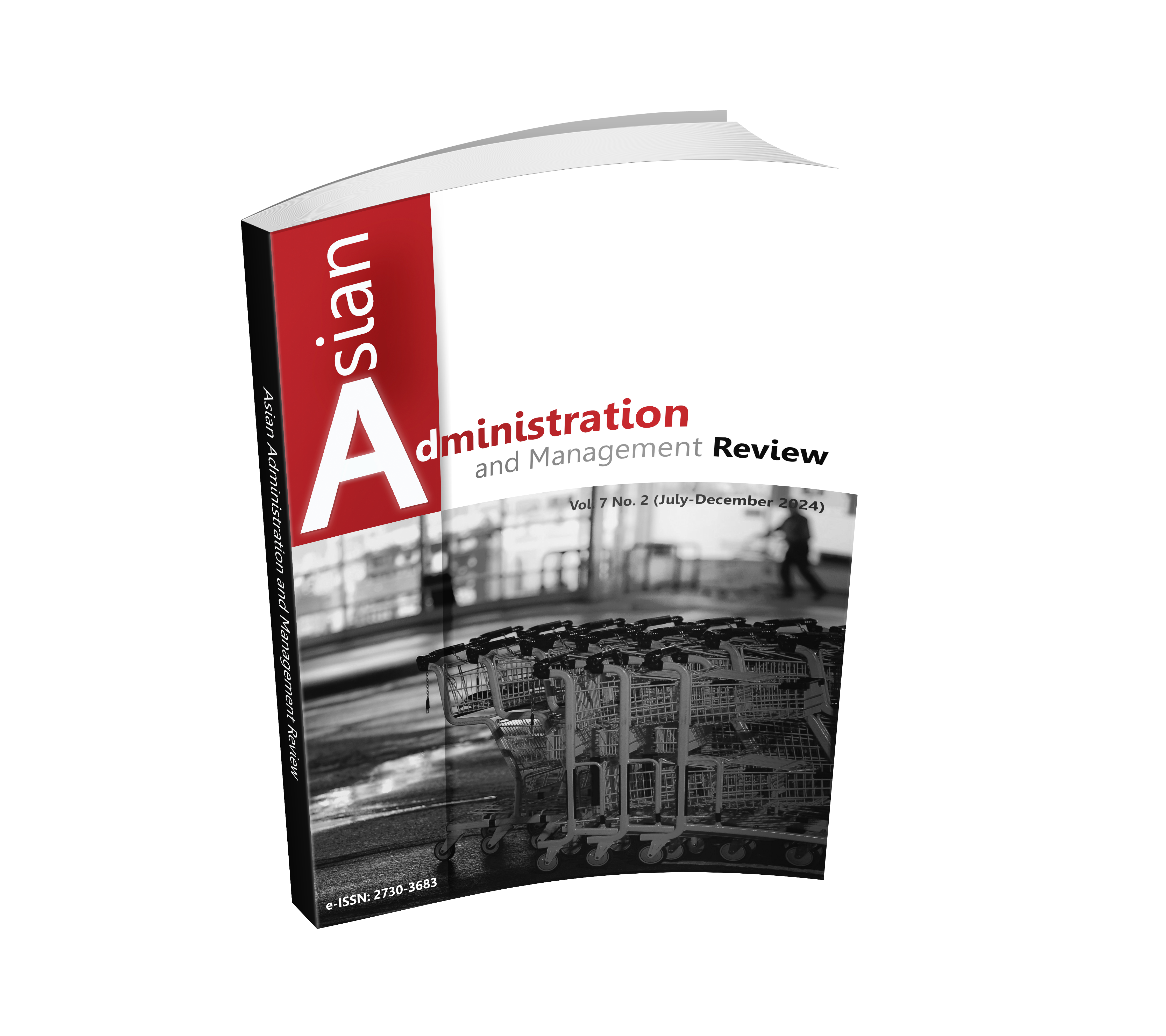UNDERSTANDING LEADERSHIP COMPETENCIES AND ITS IMPACT ON SMALL BUSINESS PROFITABILITY: EVIDENCE FROM SUB-SAHARAN AFRICA
DOI:
https://doi.org/10.14456/aamr.2024.39Keywords:
Artificial Intelligence, Communication, Managerial Roles, Technological Adoption, NigeriaAbstract
Small and Medium-sized Enterprises (SMEs) are of utmost importance in the global economy and aacademic research on leadership has continued to evolve significantly. But in Nigeria, they are challenged in many areas such as management and leadership competencies, profitability, sales growth, competitive advantage, increased market failures, and many other obstacles. This study therefore aims to investigate the effect of leadership competencies on SME profitability, in Lagos state, Nigeria, which is the most densely populated and largest consumer market in Africa. A descriptive survey approach was employed, and the research population consisted of selected small businesses in Lagos, Nigeria. The sample size of 742 was established and the sample was selected using proportionate and stratified sampling approaches. A multistage sampling technique was used for this study because SMEs are scattered across the five geo-political zones of Lagos State. A closed-ended questionnaire was created and administered, 701 responses were collected, resulting in a response rate of 95%. The findings also demonstrated a substantial correlation between management roles and self-efficacy (β = 1.2663, t = 31.2138, p < 0.05). Therefore, small and medium-sized enterprises in Nigeria need to enhance their understanding, establish effective administration, and cultivate leadership skills to enhance their profitability. The study also suggests that the management of SMEs, especially the owners/managers, should enhance their leadership and entrepreneurial skills, driven by the need for achievements.
Downloads
References
Abebaw, W., Mulate, S., & Nigussie, L. (2018). Factors Affecting the Performance of Micro and Small Scale Enterprises: Experience from North Shewa Zone, Ethiopia. Journal of Investment and Management, 7(2), 70-76.
Amoa-Gyarteng, K., & Dhliwayo, S. (2022). The Impact of Capital Structure on Profitability of Nascent Small and Medium Enterprises in Ghana. African Journal of Business and Economic Research, 17(2), 275-291.
Anand, T., & Punia, Y. (2015). Leadership competencies and their influence on leadership performance: a literature review. International Journal of Advanced Research in Management and Social Sciences, 2, 25-31.
Arapasopo, E., & Adekoya, C. (2022). Library leadership in Nigeria and COVID-19 pandemic. Information Discovery and Delivery, 50(2), 235-244.
Arasli, H., Altinay, L., & Arici, H. (2020). Seasonal employee leadership in the hospitality industry: a scale development. International Journal of Contemporary Hospitality Management, 32(6), 2195-2215.
Asree, S., Zain, M., & Razalli, M. (2010). Influence of leadership competency and organizational culture on responsiveness and performance of firms. International Journal of Contemporary Hospitality Management, 22(4), 500-516.
Birbisa, Z., & Lakew, D. (2020). The effect of leadership style on the job satisfaction of micro and small enterprises. International Research Journal of Business Studies, 13(1), 27-32.
Boyatzis, R. (1982). The Competent Manager: A Model for Effective Performance. New York: Wiley.
Braga, B., & Santos, V. (2023). Leaders in the pandemic: Contributions to the literature on leadership in organizations in extreme contexts. Revista de Administração Mackenzie, 24(6), 1-28.
Brown, S., & Crawford, M. (2022). Thinking about developing business leadership for the post-COVID world. New England Journal of Entrepreneurship, 25(2), 94-102.
Bryman, A., & Bell, E. (2015). Business Research Methods. Oxford: Oxford University Press.
Choi, S., & Williams, C. (2016). Entrepreneurial Orientation and Performance: Mediating Effects of Technology and Marketing Action across Industry Types. Industry and Innovation, 23(8), 673-693.
Cochran, W. (1997). Sampling techniques. New Jersey: John Wiley & Sons, Inc.
Collins, M., Dasborough, M., Gregg, H., Xu, C., Deen, C., He, Y., & Restubog, S. (2023). Traversing the storm: An interdisciplinary review of crisis leadership. The Leadership Quarterly, 34(1), 101661.
Cong, L., & Thu, D. (2021). The competitiveness of small and medium enterprises in the tourism sector: the role of leadership competencies. Journal of Economics and Development, 23(3), 299-316.
Fachrunnisa, O., Adhiatma, A., Lukman, N., & Majid, M. (2020). Towards SME’s digital information: The role of agile leadership and strategic flexibility. Journal of Small Business Strategy, 30(3), 65-85.
Hill, C., & Jones, G. (2015). Strategic Management: An Integrated Approach. Massachusetts: Houghton Mifflin Company.
Holland, J. (1997). Making vocational choices: A theory of vocational personalities and work environments (3rd ed.). Odessa: Psychological Assessment Resources.
Igwe, P. (2016). Entrepreneurial ecosystems and the role of government in promoting entrepreneurship. In J. Eyisi, & A. Icha-Ituma. (eds.). Building entrepreneurial universities in a developing economy: issues, challenges and prospects (pp. 30-55). Berlin: Springer.
Johnson, B. (1990). Toward a Multidimensional Model of Entrepreneurship: The Case of Achievement Motivation and the Entrepreneur. Entrepreneurship Theory and Practice, 14(3), 39-54.
Kumar, B., Rajput, N., Nagpal, P., Olubiyi, T., & Nagesh, Y. (2022). Impact of microfinance on the inclusive development of Bihar. Innovations, 71, 454-465.
Kwiotkowska, A. (2022). The interplay of resources, dynamic capabilities and technological uncertainty on digital maturity. (Organization and Management Series No.155). Poland: Silesian University of Technology.
Kwiotkowska, A., & Gębczyńska, M. (2021). Causal pathways of innovation orientation, sustainability, leadership and social performance. European Research Studies Journal, (3), 32-54.
Langat, J., & Auka, D. (2015). Effects of Strategic Planning on performance of medium sized enterprises in Nakuru town. Journal of Business Administration and Management Sciences Research, 4(2), 49-59.
Lopes, P., Grewal, D., Kadis, J., Gall, M., & Salovey, P. (2006). Evidence that emotional intelligence is related to job performance and affect and attitudes at work. Psicothema, 18(Suppl), 132-138.
Lopez, S. Peón, J., & Ordás, C. (2005). Organizational learning as a determining factor in business performance. The Learning Organization, 12(3), 227-245.
Mai, N., Do, T., & Nguyen, D. (2022). The impact of leadership competences, organizational learning and organizational innovation on business performance. Business Process Management Journal, 28(5/6), 1391-1411.
Mai, N., Do, T., & Tran, P. (2023). How leadership competences foster innovation and high performance: evidence from tourism industry in Vietnam. Journal of Hospitality and Tourism Insights, 6(3), 1253-1269.
Malinao, C., & Ebi, R. (2022). Business Management Competencies as the Driver of Small-Medium Enterprises' Survival during COVID-19 Pandemic. Puissant, 3, 296-315.
Masoud, E. (2013). The Impact of Functional Competencies on Firm Performance of Pharmaceutical Industry in Jordan. International Journal of Marketing Studies, 5(3), 56-72.
McClelland, D. (1961). The Achieving Society. New Jersey: Van Nostrand.
McClelland, D., Clark, R., Roby, T., & Atkinson, J. (1958). The effect of the need for achievement on thematic apperception. In J. Atkinson. (ed.). Motives in Fantasy, Action and Society (64-82). New Jersey: Van Nostrand.
Noor, S., & Che, Z. (2017). Leadership Competencies and Organizational Performance: Review and Proposal Framework. International Journal of Academic Research in Business and Social Sciences, 7(8), 824-831.
Olubiyi, T. (2022a). Measuring technological capability and business performance post-COVID Era: Evidence from Small and Medium-Sized Enterprises (SMEs) in Nigeria. Management & Marketing Journal, 20(2), 234-248.
Olubiyi, T. (2022b). An investigation of sustainable innovative strategy and customer satisfaction in small and medium-sized enterprises (SMEs) in Nigeria. Covenant Journal of Business and Social Sciences, 13(2), 1-24.
Olubiyi, T. (2024). An investigation of the role of airline safety management and its impact on passenger satisfaction: a study of commercial airline businesses in Nigeria. Journal of the Management Sciences, 60(4), 289-301.
Olubiyi, T., Adeoye, O., Jubril, B., Adeyemi, O., & Eyanuku, J. (2023). Measuring Inequality in Sub-Saharan Africa Post-Pandemic: Correlation Results for Workplace Inequalities and Implication for Sustainable Development Goal ten. International Journal of Professional Business Review, 8(4), e01405.
Olubiyi, T., Lawal, A., & Adeoye, O. (2022). An Empirical Study on Family Business Succession and Continuity: Perspectives from Lagos State, Nigeria. Organization and Human Capital Development, 1(1), 40-52.
Onduso, S. (2018). Leadership Competencies on Performance of Christian Private Universities in Kenya: Case of Daystar University. Nairobi: Unpublished Pan Africa Christian University.
Özdemirci, A. (2011). Corporate entrepreneurship and strategy process: A performance based research on Istanbul market. Procedia-Social and Behavioral Sciences, 24, 611-626.
Pillai, G. (2022). Leadership: Its Role Within Small and Medium-sized Enterprises. In K. Biginas, S. Sindakis, A. Koumproglou, V. Sarantinos, & Wyer, P. (eds.). Small Business Management and Control of the Uncertain External Environment (Advanced Strategies in Entrepreneurship, Education and Ecology) (pp. 85-98). West Yorkshire: Emerald Group Publishing.
Rajhans, K. (2012). Effective organizational communication: A key to employee motivation and performance. Interscience Management Review, 2(2), 81-85.
Razzaque, A., Lee, I., & Mangalaraj, G. (2024). The effect of entrepreneurial leadership traits on corporate sustainable development and firm performance: a resource-based view. European Business Review, 36(2), 177-200.
Sidek, S., & Mohamad, M. (2014). Managerial Competencies and Small Business Growth: Empirical Evidence from Microfinance Participants. International Journal of Management Studies, 21(1), 39-59.
Spendlove, M. (2007). Competencies for effective leadership in higher education. International Journal of Educational Management, 21(5), 407-417.
Sunya, J., Basalamah, S., Gani, A., & Zakaria, J. (2017). The Influence of Leadership Competency, Motivation and Organizational Culture on Employees' Job Satifisfaction and Performance in Ternate City Government. International Journal of Business Management, 2(1), 1-11.
Ukabi, O., Uba, U., Ewum, C., & Olubiyi, T. (2023). Measuring Entrepreneurial Skills and Sustainability in Small Business Enterprises Post-Pandemic: Empirical Study from Cross River State, Nigeria. International Journal of Business, Management and Economics, 4(2), 132-149.
Uwem, E., Oyedele, O., & Olubiyi, O. (2021). Workplace Green Behavior for Sustainable Competitive Advantage. In S. Atiku, & T. Fapohunda. (eds). Human Resource Management Practices for Promoting Sustainability (pp. 248-263). Pennsylvania: IGI Global.
Veliu, L, & Manxhari, M. (2017). The Impact of Managerial Competencies on Business Performance: SME’s in Kosovo. Vadyba, Journal of Management, 30(1), 59-65.
Wiklund, J., & Shepherd, D. (2003). Knowledge-Based Resources, Entrepreneurial Orientation, and the Performance of Small and Medium-Sized Business. Strategic Management Journal, 24(13), 1307-1314.
Zikmund, W. (2000). Business Research Methods. 6th ed. Birmingham: The Dryden Press.

Downloads
Published
How to Cite
Issue
Section
License
Copyright (c) 2024 Authors

This work is licensed under a Creative Commons Attribution-NonCommercial-NoDerivatives 4.0 International License.











.png)


